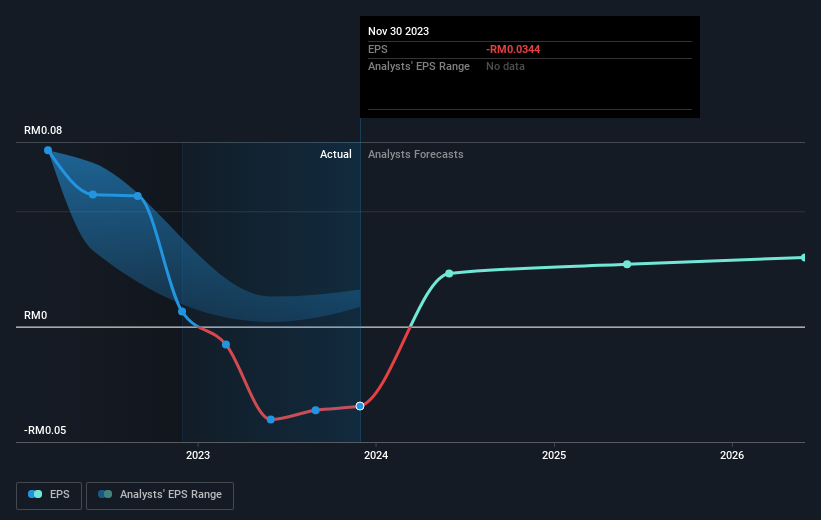Stock Analysis
- Malaysia
- /
- Construction
- /
- KLSE:GADANG
Further weakness as Gadang Holdings Berhad (KLSE:GADANG) drops 12% this week, taking five-year losses to 52%

Statistically speaking, long term investing is a profitable endeavour. But unfortunately, some companies simply don't succeed. For example the Gadang Holdings Berhad (KLSE:GADANG) share price dropped 56% over five years. That's not a lot of fun for true believers. And the share price decline continued over the last week, dropping some 12%.
Since Gadang Holdings Berhad has shed RM36m from its value in the past 7 days, let's see if the longer term decline has been driven by the business' economics.
View our latest analysis for Gadang Holdings Berhad
There is no denying that markets are sometimes efficient, but prices do not always reflect underlying business performance. By comparing earnings per share (EPS) and share price changes over time, we can get a feel for how investor attitudes to a company have morphed over time.
Over five years Gadang Holdings Berhad's earnings per share dropped significantly, falling to a loss, with the share price also lower. At present it's hard to make valid comparisons between EPS and the share price. However, we can say we'd expect to see a falling share price in this scenario.
You can see how EPS has changed over time in the image below (click on the chart to see the exact values).

This free interactive report on Gadang Holdings Berhad's earnings, revenue and cash flow is a great place to start, if you want to investigate the stock further.
What About The Total Shareholder Return (TSR)?
We'd be remiss not to mention the difference between Gadang Holdings Berhad's total shareholder return (TSR) and its share price return. The TSR is a return calculation that accounts for the value of cash dividends (assuming that any dividend received was reinvested) and the calculated value of any discounted capital raisings and spin-offs. Gadang Holdings Berhad's TSR of was a loss of 52% for the 5 years. That wasn't as bad as its share price return, because it has paid dividends.
A Different Perspective
It's nice to see that Gadang Holdings Berhad shareholders have received a total shareholder return of 25% over the last year. Notably the five-year annualised TSR loss of 9% per year compares very unfavourably with the recent share price performance. The long term loss makes us cautious, but the short term TSR gain certainly hints at a brighter future. While it is well worth considering the different impacts that market conditions can have on the share price, there are other factors that are even more important. For instance, we've identified 1 warning sign for Gadang Holdings Berhad that you should be aware of.
But note: Gadang Holdings Berhad may not be the best stock to buy. So take a peek at this free list of interesting companies with past earnings growth (and further growth forecast).
Please note, the market returns quoted in this article reflect the market weighted average returns of stocks that currently trade on Malaysian exchanges.
Valuation is complex, but we're helping make it simple.
Find out whether Gadang Holdings Berhad is potentially over or undervalued by checking out our comprehensive analysis, which includes fair value estimates, risks and warnings, dividends, insider transactions and financial health.
View the Free AnalysisHave feedback on this article? Concerned about the content? Get in touch with us directly. Alternatively, email editorial-team (at) simplywallst.com.
This article by Simply Wall St is general in nature. We provide commentary based on historical data and analyst forecasts only using an unbiased methodology and our articles are not intended to be financial advice. It does not constitute a recommendation to buy or sell any stock, and does not take account of your objectives, or your financial situation. We aim to bring you long-term focused analysis driven by fundamental data. Note that our analysis may not factor in the latest price-sensitive company announcements or qualitative material. Simply Wall St has no position in any stocks mentioned.
About KLSE:GADANG
Gadang Holdings Berhad
Gadang Holdings Berhad, an investment holding company, engages in civil engineering and construction, property development, water supply, and mechanical and electrical engineering businesses in Malaysia, Indonesia, and Singapore.
Reasonable growth potential with adequate balance sheet.

